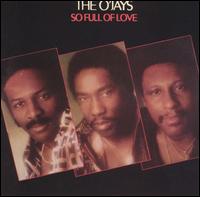| So Full of Love | ||||
|---|---|---|---|---|
 | ||||
| Studio album by | ||||
| Released | 1978 | |||
| Recorded | 1977–1978 | |||
| Studio | Sigma Sound, Philadelphia, Pennsylvania [1] | |||
| Genre | R&B | |||
| Length | 38:32 | |||
| Label | Philadelphia International | |||
| Producer | Kenneth Gamble, Leon Huff, Thom Bell, Dennis Williams, Eddie Levert, Walter Williams, Bunny Sigler | |||
| The O'Jays chronology | ||||
| ||||
So Full of Love is the twelfth album by the O'Jays, released in 1978 by Philadelphia International. [2] The album contains the No. 1 R&B hit "Use ta Be My Girl", and was awarded RIAA platinum certification for sales of 1,000,000 copies. [3]
Contents
- Critical reception
- Track listing
- Personnel
- Charts
- Weekly charts
- Year-end charts
- Singles
- See also
- References
- External links
The single "Brandy" has long been speculated by many fans to be about a woman. However, in 2013, production team Gamble and Huff revealed the song was written about a dog. [4]